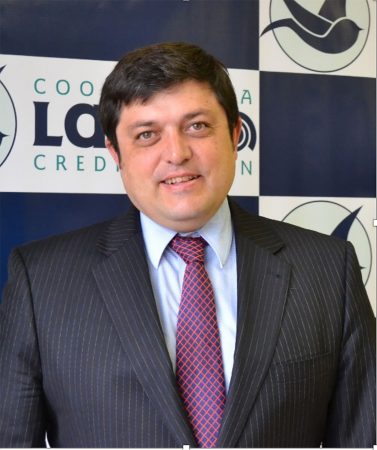
LCCU offers comprehensive financial education programs twice a year. Every summer, the program’s students attend a graduation ceremony to celebrate their completion. (Photo courtesy of the LCCU)
After nearly 20 years, the Latino Community Credit Union continues to do more than provide North Carolina’s Latino community with a safe place to store their earnings.

LCCU CEO and President Luis Pastor has been working with the credit union since 2000. A native of Spain, Pastor believes LCCU’s success is a result of its need within the community. (Photo courtesy of LCCU)
A credit union founded in Durham in 2000, LCCU works to educate and empower all communities by offering a financial education program and savings, checking, loans and credit services, according to the LCCU website. Rincon said the credit union’s linear organizational structure also forms a clear line of leadership within each department.
“It has been a great journey,” said Silvia Rincón, vice president of communications and brand management for LCCU. “We focus on serving the immigrant population, mostly Latinos, but we have gone beyond the Latino community since we identify more with the immigrant experience.”
In the late 1990s, North Carolina experienced an influx of Central American immigrants, but once they started working and getting paid in cash, banks were unprepared to serve this community said Rincon. These individuals became known as “walking ATMs” and were often robbed because they didn’t have a safe place to store their money.
“Leaders of the community got tired of this, and they reached out to banks,” Rincón said. “But banks weren’t prepared to serve the immigrant community at the time, so they decided to open their own credit union.”
While the LCCU headquarters is located on Morgan Street in Durham, it has 13 branches across North Carolina and around 78,000 members from over 134 countries. LCCU CEO and President Luis Pastor said that the LCCU has been able to grow because it was needed in the community.
“We’ve never had to close an office, we’ve never had to discontinue a program,” Pastor said. “We’ve always been taking steps forward.”
Additionally, LCCU offers comprehensive financial education programs twice a year said Rincon. The classes are facilitated in Spanish by branch managers, and there is a graduation ceremony for those who complete the program every summer. So far, over 21,000 people have participated in the classes.
“When we look at the numbers, we see that the members that participate in the classes are three times more likely to save with us, to use their accounts more wisely, to apply for loans,” Rincón said. “So for us, that means that what we’re teaching, they’re putting into practice. So, that’s really valuable.”
Pastor said the credit union charges the same rates for all its members, no matter what their credit score may be.
“We know that this is not a good indicator of your character,” he said. “Credit history is usually more an indicator of your wealth.”
Pastor and Rincón both agreed a fundamental part of LCCU’s mission is ensuring that its members trust the Credit Union. One way they achieve this goal is by providing only what they believe their members need — the LCCU currently offer one type of checking account and one type of savings account. They also do not have any paid advertising and instead choose to market themselves through word-of-mouth.
“In order to establish trust, I think you need to be consistent,” Pastor said. “You need to be transparent, and you need to deliver your promises.”
Along with the word-of-mouth approach, LCCU uses social media platforms, like Facebook, to publicize its services. LCCU Marketing and Branding Coordinator Chelsea Contreras said Facebook allows them to connect with those who don’t have a nearby branch, so people can follow what LCCU is doing.
“It’s a slow process versus paying for an ad because we are implementing something natural,”Contreras said. “We want our audience to have something in common like aunts bringing their cousins and kids.”
Rincón said LCCU is unique since every employee can speak English and Spanish, and they make sure to provide all their financial resources in Spanish. Because of the credit union’s bilingual structure, members such as Rosendo Duran Castillo of Durham feel comfortable asking financial questions.
Duran Castillo initially came to the United States from Mexico and has been a member of LCCU since 2014. He is looking to buy a house and said he appreciates how LCCU is able to work with him in Spanish.
“We can understand them here,” he said. “I like how they treat people.”

Maribel Aragon (far left), a junior at City of Medicine Academy, is a PYO intern. PYO students are required to save at least 30 percent of their internship stipends in order to reach their goal of at least $500 by high school graduation. (Photo courtesy of PYO)
The credit union finances its money back into the community by funding school improvements and arts and culture. LCCU has collaborated with Partners for Youth Opportunity to provide savings accounts for PYO interns. Pastor said these initiatives are important for young people to develop “soft skills” that will help them be comfortable in a work environment.
“There is no class that teaches this stuff, and it is not common knowledge,”Pastor said. “This is something that can be taught by parents or siblings, but if you don’t have that support, your chances of being able to progress in your career are very minimal.”
Rincón said while LCCU would like to expand to the mountains and coast of North Carolina, it is first working to ensure it is adequately serving urban communities. For example, there is only one branch in Raleigh, when the city’s population size requires a need for more said Rincon.
“We still have a lot of field to cover here,” she said. “Every time that we open a branch we think that it’s going to alleviate some of the traffic that we have, and what ends up happening is that it attracts people that don’t have accounts with us. So, we just keep growing.”
The Latino Cooperative Credit Union headquarters is located in downtown Durham on Morgan Street. Since 2000, LCCU has expanded to 13 locations and serves over 78,000 members. Staff photo by Veronica Correa.
—
Spanish version
La cooperativa Latino credit union sigue pensando hacia adelante
Diane Adame y Verónica Correa
Traducido por Verónica Correa
Después de casi 20 años, la cooperativa latino credit union sigue haciendo más que proveer a la comunidad latina en el Carolina del Norte un sitio seguro para guardar su dinero.
Una cooperativa de crédito fundada en el año 2000, la LCCU trabaja en educar y motivar todo el mundo. Ofrece programas de educación financiera y cuentas de ahorro, cheques, préstamos y servicios de crédito. Su estructura lineal crea una clara línea de liderazgo en cada departamento.
Silvia Rincón, vicepresidente de comunicaciones, dijo que ha sido una gran travesía. LCCU se enfoca en la comunidad inmigrante, especialmente los latinos, pero hemos ido más allá de la comunicad latina ya que nos identificamos más con la experiencia de los inmigrantes.
Durante los años 1990, muchos inmigrantes de Centroamérica vinieron a Carolina del Norte. Empezaban a trabajar y tener dinero en efectivo, pero los bancos no estaban preparados para servir a esa comunidad. A estas personas les llamaban “cajeros automáticos andantes” porque no tenían un sitio seguro para guardar su dinero.
Rincón dijo que los líderes de la comunidad se cansaron de eso y trataron de hablar con los bancos, pero no estaban preparados para ayudar la comunidad inmigrante. Entonces, abrieron su propia cooperativa.
Aunque la sede de LCCU está en Morgan Street en Durham, LCCU tiene 13 oficinas en Carolina del Norte y 78,000 asociados de más de 134 países. El CEO y Presidente Luis Pastor dijo que la cooperativa ha podido crecer porque la gente le tiene confianza.
Pastor dijo que nunca han tenido que cerrar una oficina o discontinuar a un programa, y siempre salen adelante.
Además de ofrecer un sitio seguro para que las personas puedan guardar sus ahorros, LCCU ofrece clases financieras dos veces al año. Los gerentes de sucursal dictan las clases en español, y hay una ceremonia de graduación cada verano. Más de 21,000 personas han tomado las clases.
Rincón dijo que los asociados que toman las clases tienen tres veces más de probabilidad de ahorrar con ellos, usar las cuentas más sabiamente, y aplicar para préstamos. Eso significa que las personas ponen en práctica lo que están aprendiendo, y eso es muy valioso.
Pastor dijo que el LCCU carga las mismas tasas de interés para cada persona, sin importar su índice de crédito. Él dijo que el índice de crédito se indica su riqueza, y no su carácter.
Pastor y Rincón dijeron que una parte fundamental de LCCU es que las personas tengan confianza en el banco. Un amanera de alcanzar ese objetivo es ofreciendo solo lo que a su parecer sus miembros necesitan. Actualmente ofrece un solo tipo de cuenta de ahorros y una de cheques. No tienen publicidad pagada, y han elegido promocionarse a través de sus asociados de boca en boca.
Pastor dijo que para tener confianza, hay que ser consistente, transparente y cumplir sus promesas.
LCCU también utiliza Facebook para promover sus servicios. Chelsea Contreras, coordinador de mercadeo y marca para LCCU, dijo que Facebook permite a LCCU conectarse con la gente que no vive cerca de una oficina.
Contreras dijo que esta manera es más lenta que pagar para los anuncios porque es más natural. Quieran que la gente tenga algo en común, como las tías trayendo a sus primos e hijos.
Rincón dijo que LCCU es diferente porque todos los empleados pueden hablar inglés y español, y todos los recursos financieros están disponibles en español. Debido a la estructura bilingüe de LCCU, miembros como Rosendo Duran Castillo de Durham se sienten cómodos haciendo preguntas financieras.
Duran Castillo vino a los E.E.U.U. desde México y ha sido un asociado de LCCU desde el 2014. Él está en el proceso de comprar una casa, y dijo que se siente muy agradecido porque los empleados pueden comunicarse con él en español. Por eso, asociados como Rosendo Duran Castillo de Durham se sienten cómodos para preguntar de los financieros.
“Aquí nos los podemos entender,” dijo Duran Castillo. “Me gustan como tratan a la gente.”
La cooperativa financia su dinero en la comunidad prestando apoyo financiero a programas de mejora a las escuelas y programas de arte y cultura. También trabajan con Partners de Youth Opportunity para dar cuentas de ahorro a los pasantes. Pastor dijo que estos programas son importantes para que los jóvenes puedan tener las habilidades necesarias para sentirse más cómodos en su trabajo.
Pastor dijo que no hay clases que enseñan estas cosas, y no son conocimientos comunes. A veces, sus familiares pueden enseñarlos, pero si no hay ese apoyo, las oportunidades de poder avanzar en una carrera son mínimas.
Rincón dijo que mientras que LCCU quiere crecer hasta las montañas y la costa de Carolina del Norte, en este momento se están enfocando en servir las ciudades. Por ejemplo, solo hay una oficina en Raleigh, pero necesitan más.
Rincón dijo que la cooperativa todavía tiene mucho terreno por cubrir. Cuando abren una oficina nueva, piensan que va a aliviar un poco el volumen de tráfico que tienen, pero lo que termina sucediendo es que atraemos nuevos asocios. Así que seguimos creciendo.
For a printer-friendly version of this story, click here